My older daughter is 13 now. By some miracle of adolescence, we still get along. But she is at an age where camping is a LOT more fun if she can bring a friend.
Taking someone else’s kid camping is a whole different ballgame than taking your own kids though. After taking my daughter and her friends camping several times, here’s what I’ve learned.
1. Other People’s Kids Are ANNOYING
Let be clear: your kids are also annoying. But you’ve just gotten used to their annoying habits. This won’t be the case with the random friend your kid is bringing along.
At home, your kids probably hang out in their bedroom or somewhere else away from you. At camp, you will be in much closer proximity. So when the kid starts whining after hiking just ¼ mile or grilling you on history facts (that happened to me on one trip), you can find yourself going a bit crazy.
So, hopefully you actually like the kid you are taking with you camping.
Tip: Get to know the kid a bit first – like having them sleep over a few times or take them on a day hike – before you take them camping.
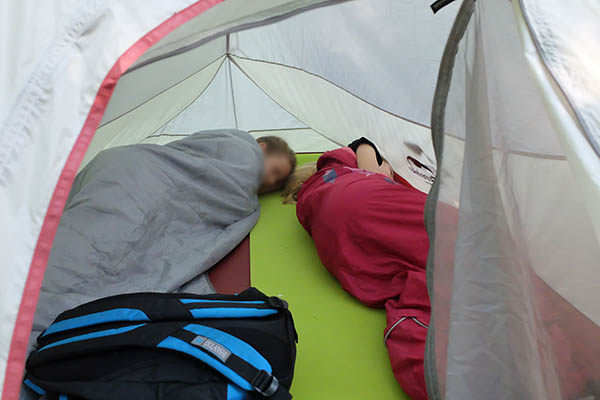
Ideally have your kid and their friend sleepin their own tent. Then they at least they won’t annoy you during the night 🙂
2. Be VERY Specific with Packing Instructions
Especially if the family isn’t outdoorsy, make sure you are very clear about what the kid needs to bring. Otherwise the kid is going to end up with inadequate clothing or supplies, which in turn could make the trip miserable for them.
For example, on one backpacking trip with my daughter’s friend, the kid showed up with a duffle bag instead of a backpack. We had to hike about a mile to camp, and the duffle bag was not comfortable for her to carry.
*You can see the Packing List I send to the parents at the end of this post.
Also Explain What NOT to Pack
The same kid also packed a bunch of things which weren’t on the list “just in case”, like sunscreen and bug spray. I didn’t put these on the list because I packed them (and packed the exact amount in smaller containers to cut weight!). This meant her already uncomfortable duffle bag was heavier than necessary.
Lesson learned: on the next trip, I was obnoxiously specific when telling the parents what they should and shouldn’t pack.
Tip: If possible, have the kid come over before the trip so you can pack together. Then you can make sure they are bringing suitable clothing/supplies.
3. You Will Be Paranoid About Injuries
It’s one thing if your own kid falls and gets some scrapes and bruises. It’s another thing if someone else’s kid gets hurt while playing in nature.
There’s not really much you can do about this (obviously you need a fully-stocked first aid kit with you!). But I mention it because I was surprised about how nervous I got about potential injuries compared to trips with just my own kids.
Also read: Camping First Aid Checklist
4. Have the Child Pick Out their Own Snacks
Don’t let the parents pack snacks. Seriously. They might pack healthy things like nuts and dried fruit. Kids would rather have cookies, pretzels, gummy bears and other junk. (I’m a health food freak but, if there’s a time to eat junk food, it’s during camping).
If the parents pack snacks that the kid doesn’t like, the kid will eat all the yummy junk food you packed. Which means you get stuck with their boring snacks.
5. And bring a LOT of Snacks
Kids can be really picky eaters. If the kid doesn’t like the meals you packed, at least they will have snacks to eat.
Tip: At least ½ of the calories you bring should be snacks. This usually means bringing approximately 1,000 calories of snacks per child, per day.
6. Tell Parents How/When You Will Check In
The places where I go camping are usually in the wilderness. There is definitely no electricity. And rarely is there a phone or internet signal. Even if there is a signal, I keep my phone turned off to conserve the battery.
In this era where kids have cell phones and are always reachable, parents can freak out if they can’t reach their kids.
So, you need to be VERY clear about when and how you will check in. For example, tell them in advance that you will send one message in the morning and again before bed, but you won’t be reachable during the day.
Not all parents will be okay with this.
I had one set of parents change their mind about letting their kid come camping with us when they heard we wouldn’t have a phone signal (and this is a family who has actually gone camping multiple times). I actually really like their kid, so was very disappointed she couldn’t come with us. Next time I will have to plan the trip someplace with a reliable signal.
7. Go Over Safety Rules with the Kids
Go over the rules before you arrive.
And again when you arrive.
And once again at critical moments, like saying “No running around the stove” as you light it up.
Don’t be surprised if the other kid is ignorant about things you think would be obvious.
For example, I let my kids poke the campfire with “poker sticks.” They have fun letting the sticks catch on fire and then extinguishing them. But I’m very strict about the rules (no waving the sticks in the air; sticks aren’t allowed to cross each other, they have to be sitting…).
But my daughter’s friend didn’t understand that the end of a stick would still be hot even after taking it out of the fire. She almost hit my daughter with the still-hot stick! This is not something I thought I’d have to explain to an 11-year old. I have since amended my rules to be stupidly detailed.
8. Also Explain Leave No Trace Rules
My kids grew up with camping, so they know not to do things like pick flowers, break tree branches or disturb nature in other ways.
Other kids might not know this. They might not even understand why “biodegradable” things like banana peels shouldn’t be thrown on the ground.
Make sure you explain these rules before and during the trip. And be mentally prepared for this so you don’t yell at the kids if they start to do something you think they should “know better” not to do. Instead, embrace this as a learning opportunity for the child and turn them into a eco warrior. 🙂
9. Make Them Work
There are a lot of camp tasks that kids can do, like:
- Setting up the tent
- Filtering water
- Gathering fire wood
- Washing dishes
My daughter used to like these tasks when she was little. Now she finds them boring and usually tries to get out of them. But, when a friend comes along, she likes doing them with her friend. It makes her feel smart and confident because she can explain what to do.
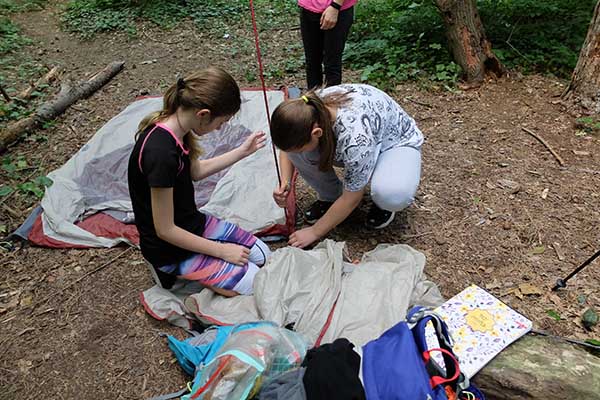
My daughter and her friend setting up the tent. She usually tries to get out of this task when it’s just the two of us 😀
10. Letting the Kids Walk Around by Themselves
As I mentioned before, you will be much more paranoid about someone else’s kid potentially getting lost or injured than your own kid. If the terrain is dangerous or has venomous snakes, you might not want to let them walk around on their own at all.
If you do let the kids wander on their own…
- Explain safety rules. Like that they should stay on the trail and stay put if they get lost.
- Have a whistle. Seriously don’t let kids go anywhere without a whistle. And explain to the kids how to use it to signal for help.
- Also have other survival supplies. Like water, snacks and rain jackets.
Btw, these are things kids and adults should have when in nature regardless!
11. Establish Rules about Phones and Devices
My kids don’t get devices when camping (my teen actually told me that she’s grateful for this!). But many kids have never gone more than a few waking hours without their phones.
Apparently one friend that I took camping with us was sneaking off to use her phone. My daughter was annoyed because she had no desire to watch TikTok videos while in nature. :/
If digital detoxing is an important part of camping for you, make sure the kids know this. Be clear about the rules so they don’t hate you when you take their phone away from them.
12. Does the Kid Have their Own Sleeping Bag?
I have 12 sleeping bags 😂, so any friends who come camping with us usually use my gear. But your kid’s friend might have their own sleeping bag. In this case, make sure you ask about the temperature rating! You don’t want to arrive at camp to realize they’ve brought an inadequate sleeping bag and will freeze their butts off the entire night.
Packing List and Instructions I Send to the Kid’s Parent
Here is the packing list I send to the parents when taking one of my kid’s friends camping with us. It is for summer camping (I’m not crazy enough to take someone else’s kid camping in shoulder seasons!). We always have to walk to camp, so it’s really important for me to be minimalist and lightweight.
You can see my family camping packing list here.
In the Backpack:
- Sandals/Crocs
- Pajamas x1 (long sleeves and pants)
- Rain jacket or softshell jacket x1
- Hoodie or sweater x1 (it gets cold at night!)
- Shirts (one per day)
- Long pants/sports leggings OR shorts x1
- Underwear (one per day)
- Socks (one per day + one extra pair)
- Bathing suit
- Hat with a brim (optional)
- Water bottle
- Toothbrush (no need to pack toothpaste unless you kid wants to use their own)
- Fun stuff
- Drawing notebook (we will pack pens and pencils; so no need to pack these)
- SMALL toy or game (I will pack ____, ___, ____, so no need to pack these)
Wear the Day Of:
- Long pants/sports leggings OR shorts (If wearing shorts, pack long pants/leggings in the backpacking. If wearing long pants/leggings, then pack shorts)
- Shirt
- Hiking boots or sneakers
*Note about clothing:
- If possible, don’t pack or wear cotton. It takes forever to dry if it gets wet. Jeans and jean shorts are especially bad. Instead, try to pack “sports clothing” made from synthetic materials. If your kid has a wool or fleece hoodie, this is best.
Food:
- Sandwich for lunch the first day
- Favorite snacks:
- Nothing that requires refrigeration.
- About 1,000 calories per day.
- Try to choose “calorie dense” foods like pretzels, cookies and energy bars.
- Avoid “fluffy” and fragile foods like chips. They break too easily.
- Also avoid foods which are covered in chocolate. They will turn into a melted mess!
Do NOT Pack:
- If I didn’t put it on the list, please don’t bring it! I’ll pack sun cream, first aid kit items, insect spray, etc. So there’s no need to pack any of these items. 🙂
- Don’t pack anything scented, like perfumed deodorant. It attracts insects.


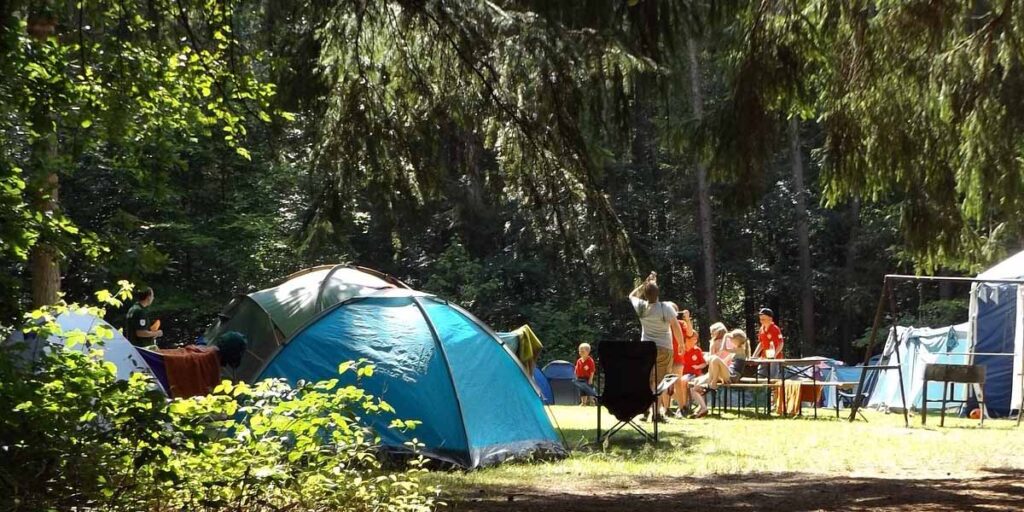
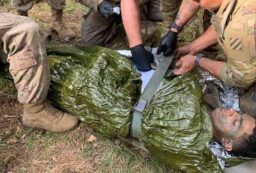
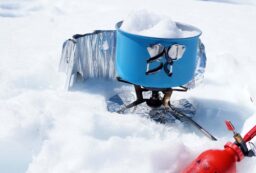
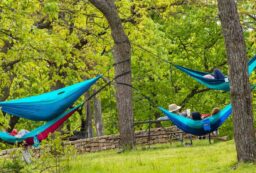
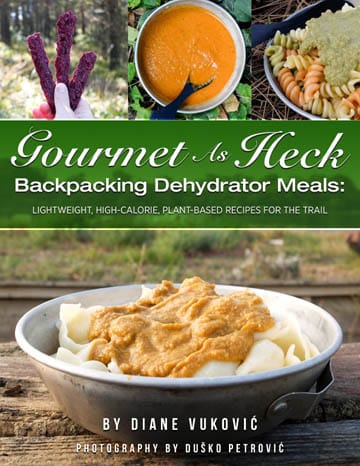
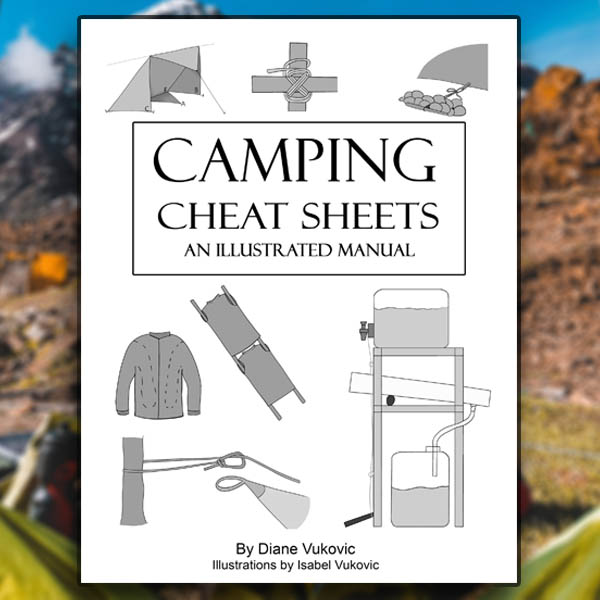


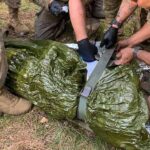
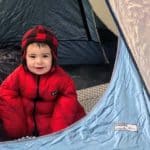
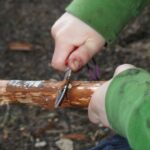
Post your comments